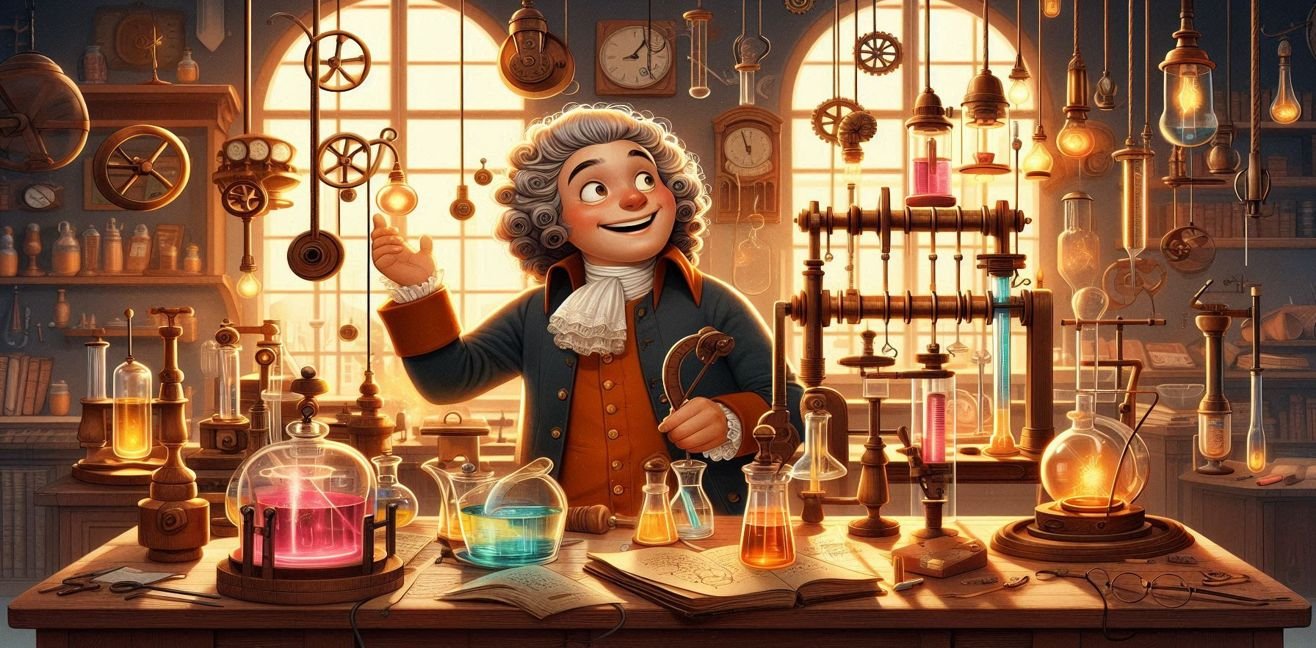Imagine… the early 1700s. In Europe, people were still scratching their heads, wondering, “Why do stars shine in the sky?” Meanwhile, there was a man whose laboratory was a whirlwind of ideas lighting up his mind. Meet John Theophilus Desaguliers! 👨🔬💡
This English physicist and inventor wasn’t just a student of Newton; he was also a science hero who brought the fun side of experimental physics to the public. Of course, no superhero cape—just a laboratory, tubes, glass containers, some quirky machines, and a lot of curiosity!
1. Physics and Engineering: The Magic of Experimentation 🔬✨
Desaguliers sent a clear message with his experiments: “Physics isn’t magic—it can be explained with logic and mathematics.” His lab was like an interactive science museum of the 1700s:
- Simple machines and levers: Desaguliers organized demonstrations with levers and pulleys to show the laws of force and motion. People at the time were practically mesmerized watching how these machines worked.
- Pressure of liquids and gases: Desaguliers was among the first to demonstrate Pascal’s studies on fluid pressure. Using water and air, he could create simple water clocks or pumps that amazed and delighted his audience.
- Electricity and static electricity: The mystery of electricity back then, which today seems as simple as lighting a small bulb, was a huge playground for Desaguliers. Experiments with Leyden jars showed how electricity could be stored and discharged, inspiring other scientists.
In short, Desaguliers transformed physics from a purely theoretical subject into a visible, understandable, and entertaining experimental spectacle.
2. The Popular Face of Enlightenment: Teaching Science 🌞
Desaguliers was not only a scientist but also a fantastic educator. His presentations at the Royal Society didn’t just deliver information—they entertained the audience:
- During a demonstration with a water pump, he accidentally splashed water onto his own shoes… and the audience learned while laughing! 😂
- He explained the laws of physics with humor and drama, making science accessible to everyone.
His approach showed that knowledge wasn’t reserved for elites; everyone could achieve mental enlightenment.
3. Inventions and Contributions: Desaguliers’ Scientific Legacy 🛠️
Desaguliers’ contributions to science were broad and technically significant:
- Thermodynamics and mechanical systems: His experiments on motion and energy relationships helped people understand hydraulic systems.
- Electrical and electrostatic experiments: Using Leyden jars and simple circuits, he demonstrated how electrical energy could be stored and transmitted, laying foundations for modern electrical science.
- Popularizing science: Thanks to his work, physics became a topic not just in books, but in laboratories, classrooms, and public discussions.
Desaguliers also served as a bridge in communicating Newton’s laws to the public, turning abstract mathematical formulas into visible, tangible demonstrations.
4. Humor and Curiosity: The Fun Side of Science 😎🎭
His approach combined serious experiments with entertaining presentations. While explaining physical laws, his lab often resembled a theater stage. People learned and laughed at the same time. Perhaps that’s why “Experimental Physics” under Desaguliers wasn’t boring but a thrilling adventure.
5. Conclusion: Physical and Mental Enlightenment ⚡🧠
John Theophilus Desaguliers demonstrated that enlightenment wasn’t just a mental pursuit—it had an experimental dimension too. Understanding physics didn’t require burying yourself in books; seeing, touching, and sometimes even getting splashed with water was enough! 😅
His legacy continues to illuminate the path for scientists and educators today. And one truth remains: without Desaguliers, physics lessons might be a lot more boring than they are now…




